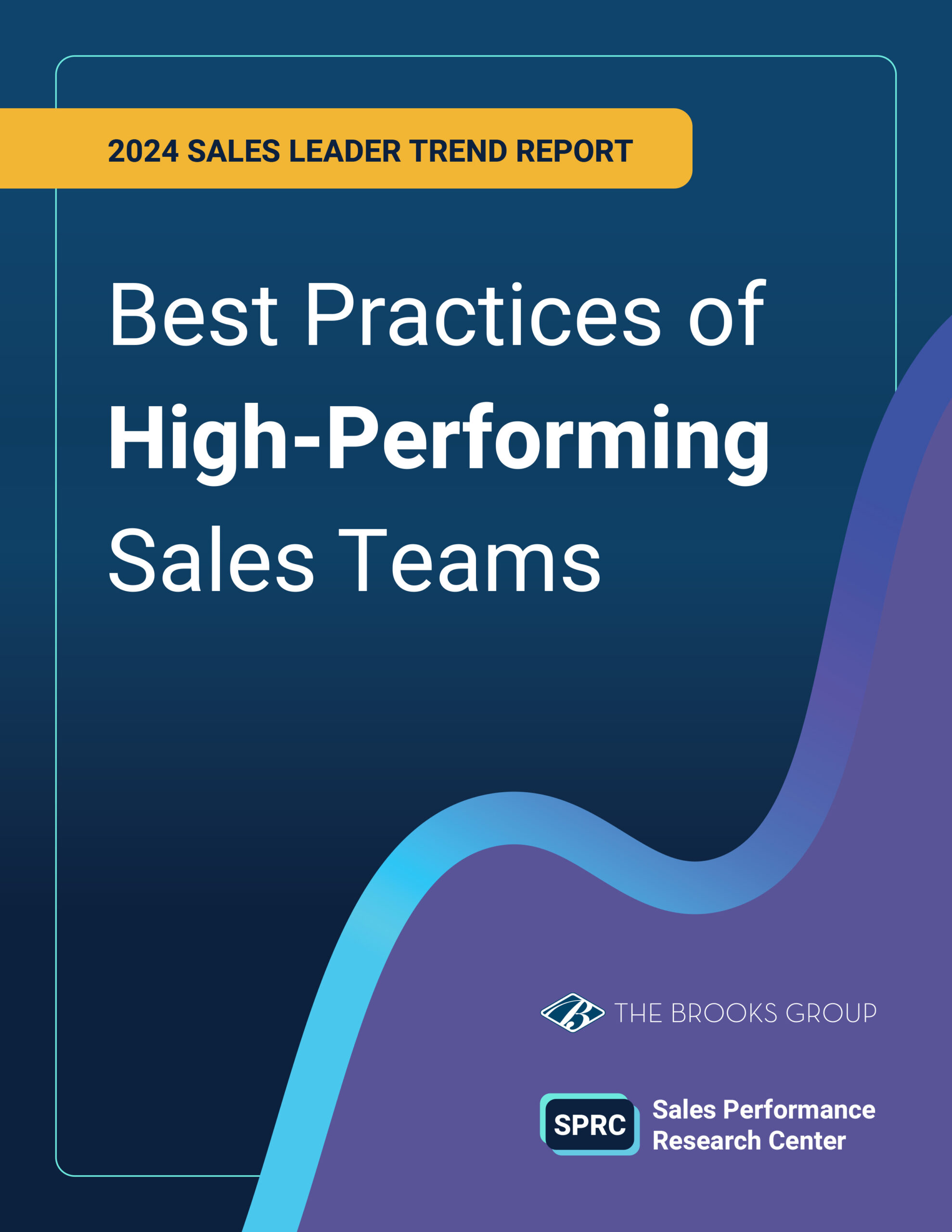Will business be back to normal in 2024? According to Morningstar experts, this may be the year we finally move past all the disruptions of the pandemic. Supply chain bottlenecks, shortages, and inflation are easing and interest rates, although still high, will drop.
This is good news for B2B sales teams that have faced economic headwinds, shrinking customer budgets, and delayed or canceled purchasing decisions.
But even throughout this tough period, some sales organizations have found a way to meet or exceed targets—and feel confident in their ability to do it again this year.
What are high-performance sales teams doing differently?
That is the question our new research report, Best Practices of High-Performing Sales Teams for 2024, set out to answer.
We surveyed over 150 B2B sales leaders across multiple industries to identify trends in seller capabilities and sales leader priorities for 2024.
To understand what the best players do differently, we grouped our findings into “successful” teams—those that met or exceeded their previous year’s revenue goal—and “underperforming” teams—those that were below their revenue goal.
In this blog post we share 6 of the key differences between successful and underperforming teams. Sales leaders using these approaches have developed resilient, capable sales professionals who can sell effectively and efficiently regardless of market conditions.
To see all the attributes of top-performing sales teams download your copy of the full 2024 Sales Leader Trend report here.
6 Sales Strategies of Successful Sales Teams
Adopt these six sales strategies to improve sales performance and achieve revenue goals this year.
Sales Strategy 1: “If you have a sales process, you’ve gotta use it.”
We found sales process adherence is an important factor for sales performance. In contrast with underperforming teams, sales teams that met or exceeded the previous year’s revenue goals are more likely to consistently follow their sales process. 95% of successful teams closely adhere to their sales process, but only 69% of underperforming teams do so.
We also found successful teams are more likely to integrate their sales process into their CRM. 62% of successful teams integrate the sales process into their CRM; only 40% of underperforming teams do.
Sales Strategy 2: “Anything worth doing is worth doing well.”
We also found successful teams are more competent than underperforming teams across all stages of the sales process. 83% of teams that rarely follow the sales process were behind goal last year. And 89% of teams that follow a sales process most or all of the time are better at connecting the value of their solution to ROI for the customer.
Sales Strategy 3: “Asking questions is good. Asking the right questions is better.”
Successful sales teams use more effective sales discovery and questioning approaches than underperforming teams, but still have room for development. 54% of successful teams use one of the top two questioning strategies vs. 33% of underperforming teams.
Two-thirds of underperforming teams use the least effective questioning strategies. Because they aren’t doing discovery well, most organizations are leaving significant potential revenue on the table.
Sales Strategy 4: “When you value what you do, the world will value who you are.”
High-performing sales teams present solutions based on value instead of price. They are twice as likely as underperforming teams to connect the value of their solution to ROI for the customer.
Underperforming teams are seven times more likely than successful teams to present based on price.
Sales Strategy 5: “Level up your hiring, level up your game.”
Hiring best practices, tools, and assessments contribute to stronger performance. 73% of teams that identified closing the sale as a top challenge do not use assessments when hiring.
Adherence to best practice hiring tools and strategies can improve a sales team’s odds of strong sales performance. Even more so, not using these tools and strategies may be a stronger predictor of sales team underperformance.
More than half of successful sales teams use hiring tools such as personality assessments, sales skill assessments, and hiring profiles or job benchmarks, while 65% of organizations that don’t use them are below target.
Sales Strategy 6: “Building a dream team? Sales Coaching is the secret sauce.”
Coaching—either from sales managers or peers—plays an important role in seller engagement and performance. Successful sales teams are more likely to leverage coaching as part of their training and development strategy. 58% of successful teams cite coaching as a method for continuous training and development, compared to 44% of underperforming teams.
More of their team members are on track to achieve quota, and their teams are more engaged and optimistic. 68% of teams that are mostly or fully engaged receive coaching from sales managers.
5 Recommendations for Sales Leaders to Improve Sales Performance
Follow these practical recommendations to level up your sales team’s performance in 2024.
Recommendation 1: Adopt, communicate, and enforce a well-defined sales process.
Compared to underperforming teams, sales teams that meet or exceed sales goals are more likely to consistently follow their sales process, less likely to struggle across all stages of the sales process, and more likely to integrate their sales process into their CRM.
Visit The Brooks Group to learn about our award-winning IMPACT sales process and sales skills training programs.
Recommendation 2: Train your sales team to use effective questioning and value-based approaches.
Most teams rely on product-based questions—one of the least effective questioning strategies. This means most organizations are failing to progress a huge number of potential opportunities. Home in on why the prospect wants your product or service, how they want it to work, and the impact they want the product to have in terms of value and ROI.
Recommendation 3: Develop negotiation and qualification skills
All teams struggle with negotiation and qualification. Sales leaders identified negotiation and qualifying new opportunities as top selling gaps, regardless of whether teams met goal or not. This is an area of opportunity that can help differentiate your sales professionals and improve results.
Recommendation 4: Make time for peer-to-peer and manager coaching.
Coaching—either from managers or peers—plays an important role in seller engagement and performance. Successful sales teams are more likely to leverage coaching as part of their training and development strategy. More of their team members are on track to achieve quota, and their teams are more engaged and optimistic.
Recommendation 5: Follow hiring best practices, using tools and assessments to build a stronger sales team.
Adherence to best practice hiring tools and strategies can improve a sales team’s odds of strong sales performance. Hiring tools such as personality assessments, sales skill assessments, and hiring profiles or sales job benchmarks enable sales leaders to identify, assess, and develop their team appropriately.
Learn More
Get your free copy of the 2024 Sales Leader Trend Report: Best Practices of High-Performing Sales Teams.
Find out more about our award-winning IMPACT sales process and skills training programs.
Download our Ultimate Guide to an Effective Sales Process.
2024 Sales Leader Trend Report
Best Practices of High-Performing Sales Teams
What do top performing sales teams do differently? We surveyed B2B sales leaders across multiple industries at organizations to discover the answer.
In this research report, we share what the best sales teams do differently.





